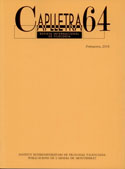Constructions with shell nouns in English: their dual role in information packaging
DOI:
https://doi.org/10.7203/caplletra.64.11381Keywords:
focus formulas, discourse signposts, information packaging, shell nouns, grammaticalization, pragmaticalization Abstract
Abstract
The focus in this paper is on structural and functional properties of a marginal type of focus formulas in English, known as N-be-that-constructions (Schmid 2001), cf. The problem is that he is jealous. They are referred to here as focus formulas with shell nouns (FFSNs). The role of the nouns in these templates is to create conceptual shells (Schmid 1997) into which the propositional content is encapsulated, with both the parts being co-referentially linked. The BNC data have revealed two manifestations of FFSNs in discourse: they occurred either as fixed utterance-initial templates (The thing is that killing got to be a habit.), or as looser configurations, co-occurring with various discourse signposts (DSs), as in Mm. well I mean there’s the the other thing is you see… My view, inspired by Schmid (2001) and outlined in Válková and Tárnyiková (2015), is that the FFSNs can have a dual role in discourse, operating either as focalizers or as discourse signposts participating in a number of pragmatic strategies associated with facework. The aim is to argue for the validity of this claim and give evidence of and reasoning for the focality loss cases.
 Downloads
Downloads
Downloads
Published
How to Cite
-
Abstract633
-
PDF407
Issue
Section
License
Authors submitting work to Caplletra for publication must be the legitimate holder of the usage rights. Legitimacy for the purposes of publishing the work must also include images, tables, diagrams and any other materials that may complement the text, whether they are the author of such material or not.
Copyright: on publishing their work in the journal, the author grants Caplletra. Revista Internacional de Filologia usage rights (reproduction, distribution and public communication) for both the paper printed version and for the electronic version.
All work published in Caplletra is covered by the Creative Commons license type Attribution-NonCommercial-NoDerivatives 4.0 (CC BY-NC-ND 4.0).
RESPONSABILITY
Caplletra. Revista Internacional de Filologia does not necessarily identify with the points of view expressed in the papers it publishes.
Caplletra. Revista Internacional de Filologia accepts no responsibility whatsoever for any eventual infringement of intellectual property rights on the part of authors.






